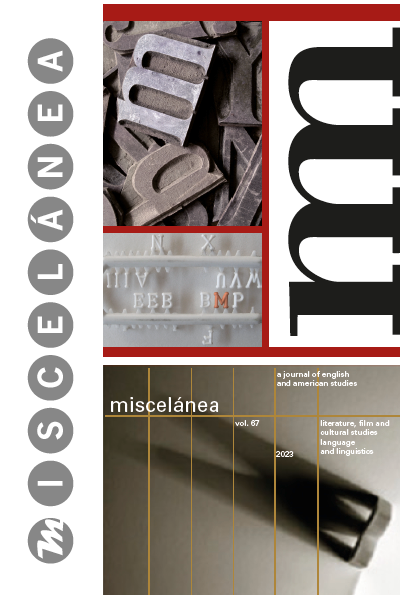Transformando la ira en cuidado: Análisis de la identidad y la relacionalidad de la mujer negra en la obra de Zadie Smith Swing Time (2016)
DOI:
https://doi.org/10.26754/ojs_misc/mj.20237246Palabras clave:
ira, cuidado, teoría de los afectos, identidad femenina, relaciones femeninasResumen
Este artículo tiene como objetivo la exploración del potencial político que posee la ira en la construcción de identidad y el desarrollo de la solidaridad femenina de la mujer negra en la obra Swing Time (2016), de Zadie Smith. Sostengo que los argumentos expuestos por Audre Lorde en Sister Outsider (1984) son especialmente adecuados para entender cómo funciona la ira en esta obra, donde dicha emoción se presenta como una poderosa fuente de energía que tiene la capacidad de mover al sujeto femenino hacia una identidad más liberadora (Lorde 2019: 120). También exploro, a través de los discursos de Lorde (2019) y bell hooks (1995, 2012), los límites sociales y los efectos potencialmente dañinos vinculados a esta emoción. Concretamente, considero cómo la ira en sí no es suficiente para garantizar una identidad estable porque no motiva de manera intrínseca el desarrollo de la solidaridad femenina. Por el contrario, Smith demuestra cómo la ira puede complementarse eficazmente a través del paradigma del cuidado, que sí anima a las protagonistas a conectar entre ellas, y expone el potencial liberador de una visión más colectiva del mundo.
Descargas
Citas
Ahmed, Sara. 2004. The Cultural Politics of Emotion. Edinburgh: Edinburgh UP.
Baillie, Justine. 2019. “Morrison and the Transnation: Toni Morrison, God Help the Child and Zadie Smith, Swing Time”. Contemporary Women's Writing 13 (3): 287-306. https://doi.org/10.1093/cww/vpaa009
Brennan, Teresa. 2004. The Transmission of Affect. Ithaca: Cornell UP.
Chodorow, Nancy J. 1978. The Reproduction of Mothering: Psychoanalysis and the Sociology of Gender. Berkeley, LA: University of California Press.
Collins, Patricia Hill. 2000. Black Feminist Thought: Knowledge, Consciousness, and the Politics of Empowerment. 2nd ed. New York: Routledge.
Crenshaw, Kimberle. 1991. “Mapping the Margins: Intersectionality, Identity Politics, and Violence against Women of Color”. Standford Law Review 43 (6): 1241-1299. https://doi.org/10.2307/1229039
Fisher, Philip. 2003. The Vehement Passions. Princeton: Princeton UP.
Gilligan, Carol. (1995) 2018. “Moral Orientation and Moral Development”. In Held, Virginia (ed.) Justice and Care: Essential Readings in Feminist Ethics. New York: Routledge: 31-46.
Hemmings, Clare. 2012. “Affective Solidarity: Feminist Reflexivity and Political Transformation”. Feminist Theory 13 (2): 147-161. https://doi.org/10.1177/1464700112442643
Hirsch, Marianne. 1989. The Mother/Daughter Plot: Narrative, Psychoanalysis, Feminism. Bloomington: Indiana UP.
hooks, bell. 1995. Killing Rage: Ending Racism. New York: Henry Holt and Company.
hooks, bell. 2012. Writing Beyond Race: Living Theory and Practice. London: Taylor & Francis Group.
Jaggar, Alison M. (1995) 2018. “Caring as a Feminist Practice of Moral Reason”. In Held, Virginia (ed.) Justice and Care: Essential Readings in Feminist Ethics. New York: Routledge: 179-202.
Kent, Jacinta. 2021. “Scapegoating and the ‘Angry Black Woman’”. Group Analysis 54 (3): 354-371. https://doi.org/10.1177/0533316421992300
Kürpick, Malou. 2018. “The Cultural and Intersectional Politics of Nomadism in Zadie Smith's Swing Time”. HJEAS : Hungarian Journal of English and American Studies 24 (2): 331-345. https://ojs.lib.unideb.hu/hjeas/article/view/7230
López-Ropero, Lourdes. 2016. “Searching for a Different Kind of Freedom: Postcoloniality and Postfeminist Subjecthood in Zadie Smith's NW”. Atlantis 38 (2): 123-139. https://www.atlantisjournal.org/index.php/atlantis/article/view/176.
Lorde, Audre. (1984) 2019. Sister Outsider. London: Penguin Books.
Pérez-Zapata, Beatriz. 2021. Zadie Smith and Postcolonial Trauma: Decolonising Trauma, Decolonising Selves. New York: Routledge.
Quabeck, Franziska. 2018. “‘A Kind of Shadow’: Mirror Images and Alter Egos in Zadie Smith’s Swing Time”. Zeitschrift Für Anglistik Und Amerikanistik 66 (4): 461-477. https://doi.org/10.1515/zaa-2018-0038
Smith, Zadie. 2016. Swing Time. London: Hamish Hamilton.
Descargas
Publicado
Cómo citar
Número
Sección
Licencia
Derechos de autor 2023 Teresa Martínez-Quiles

Esta obra está bajo una licencia internacional Creative Commons Atribución-NoComercial 4.0.
Aceptado 2023-04-17
Publicado 2023-06-30


